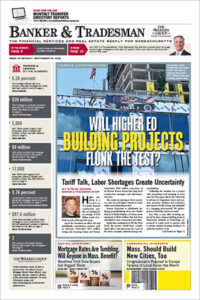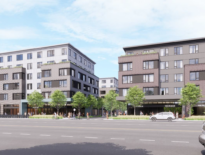Updated assessment data from Boston City Hall shows a smaller projected increase in residential property taxes in 2025, but Mayor Michelle Wu is still lobbying for legislation shifting a larger portion of the tax levy onto commercial properties.
The latest data now shows that a typical single-family property would receive a tax bill increase of nearly 28 percent starting in January, compared with 33 percent under previous estimates, according to data released by the mayor’s office today.
“That is a significant increase for residents to bear, and it affirms that this [tax legislation] tool is needed,” Wu said in a media briefing.
Under a home rule petition that’s stalled on Beacon Hill, Wu is seeking to shift a larger percentage of Boston’s tax levy to the commercial sector than is currently allowed under state law for the next three fiscal years.
A commercial property valued at $5 million would pay $117,936 in fiscal 2025 under the current system, and $125,671 if the new tax shift is adopted, according to administration estimates. The figures represent a 6.7 percent and 0.5 percent decrease from the previous year, respectively.
Average residential bills would rise $768 without a change in the tax structure, and $273 if the Home Rule petition is approved.
Timing of the bill’s passage is becoming critical as the city of Boston prepares to issue tax bills for the second half of the fiscal year.
Parcel-by-parcel assessments will be completed by the end of October, and a vote of the City Council to set tax rates for the 2025 calendar year is needed by late November to mail tax bills before January, Chief Financial Officer Ashley Groffenberger said.
Because commercial assessments are dropping because of declining occupancy, the residential sector will assume a larger portion of the total tax levy under either scenario.
Wu’s proposal has been opposed by real estate industry groups that say it would add financial burdens to an industry struggling with record office and lab building vacancies and declining revenues.
At the end of the third quarter, Boston’s direct office vacancy rate stood at 18.8 percent, according to an Avison Young report released this week. The office market totals over 218 million square feet of properties.
The city’s new estimates reflect some improvement in commercial valuations, Assessing Department Commissioner Nicholas Ariniello said.
“We saw there is definitely that impact that is happening for a lot of our class B and C office space, but that doesn’t necessarily spread to all office space. It doesn’t necessarily spread to retail space [and personal property assessments],” Ariniello said.
Legislators have expressed skepticism about granting Boston an exception to the maximum tax shift allowed under state law, even for a temporary period.
Others including the Boston Municipal Research Bureau have urged Wu to reduce spending as an alternative. Between fiscal years 2015 and 2024, Boston’s budget grew by 54.8 percent, according to the research bureau, to $4.6 billion.
Wu said spending cuts would adversely affect public services and the response to homelessness and the opioid crisis.
“The importance of public safety becomes even more paramount. We are very aware of the role we play in fostering the best possible environment not only for residents, but the business community as well,” Wu said.
Wu’s proposal was approved overwhelmingly in the Massachusetts House of Representatives in June, but stalled in the Senate as the formal legislative session drew to a close. Senate President Karen Spilka’s office said the policy could do “serious damage to Boston’s economy.” At a legislative hearing in June, some lawmakers questioned whether more businesses would relocate to the suburbs to reduce operating costs.
Legislators also pointed to Boston’s relatively low property tax rate in relation compared with most surrounding communities.
However, Wu has continued to lobby senators, including meeting with Spilka and other stakeholders periodically into the fall.









